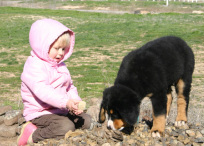Why is it that some dogs are aggressive while others are shy; some are social when others are loners?
Consider this:

Studies have proven that genetics account for about 35% of the performance of a dog. So what about the remaining 65%?
As each animal grows and develops three kinds of stimulation have been identified that impact and influence how it will develop and be shaped as an individual. The first stage is called early neurological stimulation, and the second stage is called socialization. The third stage is called later enrichment.
1) Neurological stimulation:
There are a series of short exercises for pups ranging from tickling between their toes with cotton swabs, placing them on a cold damp towel, or holding them tummy-side up in the palm of your hands, etc. These slightly stressful situations stimulate the young pup’s neurological system by kicking it into action earlier than would be normally expected. The result being an increased capacity that later will help to make the difference in its performance.
Benefits of Stimulation
1. Improved cardio vascular performance (heart rate)
2. Stronger heart beats
3. Stronger adrenal glands
4. More tolerance to stress
5. Greater resistance to disease
Handling and touching all parts of their anatomy is also necessary to learn as early as the third day of life. Pups that are handled early and on a regular basis, generally do not become hand shy as adults. When compared in a test environment, stimulated puppies were less disturbed or upset, remained more calm, and made fewer errors in the test.
2) Socialization:
Socializing puppies means exposing them to a wide variety of situations in their first weeks of life. Studies have shown that the most critical period is between weeks 4 and 16. This means exposing them to children, people, toys and other animals on a regular basis. Other examples include letting them romp on a crinkly, wobbly or wet surface, running a vacuum cleaner in their presence, pushing a stroller, lawn mower or other objet on wheels right by them, taking the puppies out to experience stores, parks, car rides, etc, and introducing them to all sorts of people, namely children, elderly people, police officers or other uniforms, people wearing hats, mail carriers, etc. An occasional bath is a great way to prepare a dog to enjoy water and grooming. Introduction to other animals such as cats, horses, and of course other dogs; now and then exposing them to loud noises like hammering, gunshot or firecrackers; in other words, anything that you would want an adult comfortable around.
Benefits of Socialization
Having a dog that is confident and pleasant in day to day situations, when the mail is being delivered, when you go out with friends, when you are vacuuming or watching fireworks makes it such a rewarding experience! That is the true potential and wonderful companionship a dog has to offer. Lack of adequate socialization generally results in unacceptable behavior and often times produces undesirable aggression, excessiveness, fearfulness, sexual inadequacy, and indifference toward partners.
Attempts to re-socialize them when adults have only produced small gains. These failures confirm the notion that the window of time open for early neurological and social stimulation only comes once. After it passes, little or nothing can be done to overcome the negative effects of the lack of stimulation.
3) Later enrichment
In later enrichment puppies’ nervous systems are developing and storing information that may be of inestimable use at a later date.
Regular trips to the park, shopping centers and obedience and agility classes serve as good examples of enrichment activities. In other words, these are the learning and training sessions that fall in the responsibility of the puppy buyer. Early training is very important in teaching a puppy how to be housebroken, how to obey simple commands such as : sit, down, stay, come, stand, heel, leave it, etc. A dog who knows what’s expected of him/her is so much happier! True, it requires work on your part, but just a little bit each day and is well worth every effort. The social setting of a puppy class, in addition to teaching basic obedience will expose him/her to other puppies, thus promoting good behavior around other dogs.
While chasing and retrieving a ball on the surface seems to be enriching because it provides exercise and includes rewards, actually does not replace the important enrichment of social and obedience training.
